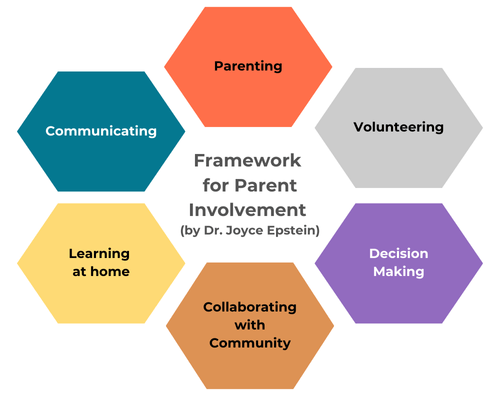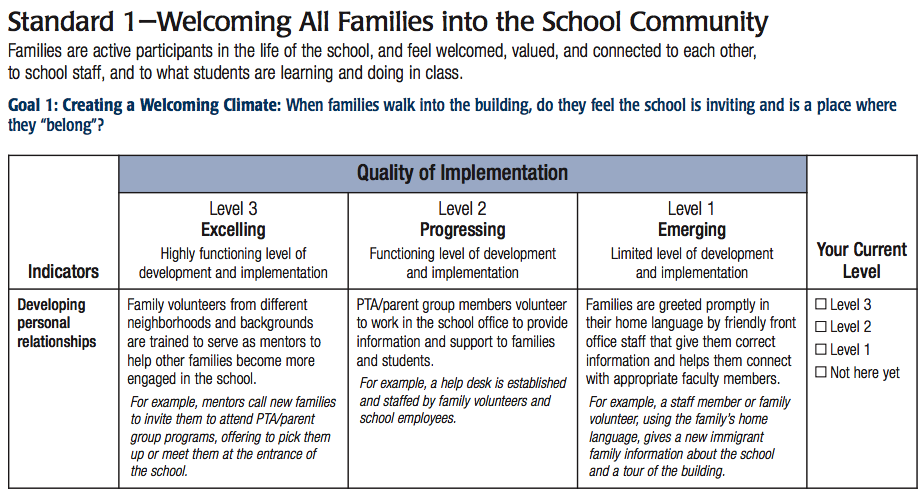
Teachers matter a lot, but when it comes to education it all starts with parents.
In This Lesson

How can parents help kids succeed in school?
How does poverty affect parenting?
What happens in a parent-teacher conference?
Why should we read to kids? Isn't talking enough?
How can parents get involved in schools?
What does research say about parent involvement?
▶ Watch the video summary
★ Discussion Guide.
This lesson focuses on the roles that parents and caregivers can play in making education work, both for their own kids and for the broader community.
Birth to age five really matters
Learning begins well before formal education does. A child fortunate enough to be born healthy and to grow up safe and secure will generally do better at school and in life than a child raised in adversity or neglect.
Reading, even more than talking, builds early literacy skills. It makes sense: the language in books is usually more enriching than everyday speech. Reading out loud and playing with your children improves their behavior and attentiveness, skills imperative for success in school.
Before kindergarten, parents are kind of on their own to figure out what to do with their kids. Some non-profit organizations try to support parents as teachers. For example, the non-profit organization Reach Out and Read promotes the importance of reading to children. Meanwhile, The national PTA partners with Reading Rockets to provide family learning tools.
Poverty hurts learning

Education researcher David Berliner calls poverty “the unexamined 600 pound gorilla in the classroom.” He argues that poverty disrupts parents’ capacity to support their kids so massively that it just can't be ignored. The strong connection between poverty and student learning is examined in Ed100 Lesson 2.2.
Poverty makes it extremely hard for parents to participate in schools.
The poverty gorilla shows up in all kinds of ways. By age 3, for example, children from high-income families are exposed to more words than children from families on welfare. This disparity has an enormous impact on children’s intellectual development.
In a similar vein, research shows that parents’ income influences their ability to read and engage with their children. Harvard University’s Center on the Developing Child corroborates this work, examining the biological impact of stress and neglect on kids and offering a set of eight key insights about child development.
How can parents help kids succeed in school?
Parents make a huge decision for their kids: Choosing a school, which we discuss in Ed100 Lessons 5.1 and 5.2.
Beyond that crucial choice, parents are involved in countless ways. From preparing your child for the first day of school to creating a space for learning at home, parent engagement makes a difference in the success of a child - and also the success of a school. Much of the research in this area is influenced by the work of Joyce Epstein of Johns Hopkins, who identified six areas of engagement:

It is relatively easy to engage English-speaking and highly-educated parents in school. It's what they expect and often demand. The real work lies in creating a school environment that welcomes all parents, including those with limited time, those who don’t speak English, and those who may not have experienced success in school themselves. School-based parent organizations are critical to that work.
What is a parent-teacher conference?
Once or twice a year, many schools try to arrange for parents to visit their child's school and meet their child's teacher or teachers. In most schools, parent-teacher conferences are scheduled toward the beginning and end of the school year. In well-to-do communities, parents almost always show up, and meetings might last as long as an hour, but they vary massively. At their best, parent-teacher conferences are personal and action-oriented — they enable the adults involved in a child's education to align their efforts. If a child is struggling, the parent-teacher conference is an opportunity to identify specific shared actions to do something about it.
Parent-teacher conferences can reinforce wishful thinking
Practically speaking, however, parent-teacher conference attendance tends to be spotty, and the conversations tend to be brief. Worse, parent-teacher conferences can serve up more wishful thinking than brutal honesty. It's human nature.
There's very little research about parent-teacher conferences, and there's no particular reason why they should work as they do (or don't.) For example, in some schools parent conferences include the student. Some are conducted in small groups. Often, parents can request a conference by contacting their child’s teacher. Depending on the school and age group, the structure for a conference may vary such as for students receiving grades C- or lower, attending after-school hours, reserving Zoom meetings, and during a half-day or no school day.
How to develop teaching skills as a parent
As kids grow up, their needs become increasingly complex. Stuff happens, and responding to the challenges of parenting can be emotionally taxing. Parenting gradually becomes more like counseling or coaching, which (news flash) turns out to be rather hard.
Some schools, PTAs, and sports programs invest in training events or programs to help parents develop basic skills as parents and leaders. Some key ideas are glaringly obvious — but only after you've heard them. (The peanut-butter mindset, for example.)
Greatschools.org, a non-profit organization, has a huge collection of free, well-researched, well-edited resources about parenting skills for all sorts of situations. Rather than waiting for these situations to come up, register for their free newsletter. By entering your child's grade level you'll get a steady drip of parenting insights to help you stay a little ahead of parenting challenges that might arise.
How can parents get involved in school decisions?
Volunteer. Many schools have a PTA or other parent group. Getting involved as a volunteer is a great way to understand your school's advantages and challenges. It's also a good way to meet the school principal and teacher leaders.
Attend site council meetings. Principals make many important school-level decisions in conversation with a site council, a small group that consists of parents, students and faculty, often including the local union representative. Meetings are public.
Connect with district leaders. Many crucial decisions are beyond the control of a principal or site council. In California, a great deal of authority lies with the school district, which is managed by the local superintendent of schools. If you want something changed that's beyond the power of your school principal, contacting the district office is the next step. If you can't find the right contact at the district office, ask your representative on the school board for advice.
Use the LCAP process. If your idea or concern will require significant change, it needs to become part of the district's formal plan. Each school district in California operates on a three-year Local Control Accountability Plan (LCAP) that must be adopted annually by the school board with review by the County Office of Education. You can learn much more about the process in Ed100 Lesson 7.10.
Don't bother the mayor. If you are trying to make changes in schools, it's usually a waste of time to appeal to the mayor or city council. As Ed100 Lesson 7.3 explains, they have little or no influence over schools, which are a separate arm of government.
The value of an engaged parent community
Parents can bring so much value to a school system that we committed a full Ed100 lesson to the subject in our chapter about funding and resources — see Lesson 8.11. In 2014, EdSource released conclusions from a survey about ways to support parent involvement in schools. Among the top findings? Give parents advance notice about meetings, offer translation services, and hold the meetings when parents are available. Through the LCAP, parents and communities have a say in how school districts set priorities and spend money. But how can you make informed decisions? Try these resources to get started:
- Ed100’s LCAP parent checklist helps parents identify the most important needs at a school.
- The National PTA scorecard helps school communities evaluate their current level of parent engagement, take action to expand it, and measure improvement over time. The scorecard includes six standards, based on Joyce Epstein’s model of parent engagement, with three levels of implementation for each standard.
 PTA National Standards for Family-School Partnerships Assessment Guide ©California State PTA
PTA National Standards for Family-School Partnerships Assessment Guide ©California State PTAJoining your school’s PTA or parent group is an important first step in learning more about your school and how you can help make it even better.
The California State PTA has also created parent academies called School Smarts to help parents navigate their local school systems and become effective child advocates. School districts that have used the program reported that it helped parents feel comfortable and informed to participate in school decision-making.
A wealth of evidence shows that parent and family engagement in schools can strengthen them and improve the quality of education. Check out the National PTA Diversity and Inclusion Toolkit for ideas. The toolkit includes survey questions you can use to measure improvement. (Also available in Spanish.)
Updated December 2024
Quiz×
CHAPTER 2:
Students...
-
Students...
Overview of Chapter 2 -
Diversity
The Changing Face of America's Students -
Poverty and Race
How Do Students' Backgrounds Affect Their School Performance? -
Health and Education
What Can Schools Do? -
The Role of Parents
Education and Families -
How Does Education Change
Inputs and Outcomes -
Motivation
What Motivates Students? -
Special Education
Why Not Teach All Kids Alike? -
Child Protection
Intervention and foster care -
Undocumented Students
Education vs. Documentation -
Student Leadership
Student Voice in Schools
Related
Sharing is caring!
Password Reset
Search all lesson and blog content here.
Login with Email
We will send your Login Link to your email
address. Click on the link and you will be
logged into Ed100. No more passwords to
remember!














Questions & Comments
To comment or reply, please sign in .
Carol Kocivar October 30, 2025 at 2:19 pm
[Reported in EdWeek] David Gundale, the principal of Open World Learning Community, a public magnet school in St. Paul, Minn., serving grades 6-12, says between 85% to 100% of parents routinely show up for twice-a-year conferences. What’s the secret? The parent-teacher conferences are led by the students.
“The participation level is over twice the amount of a traditional parent check-in with teachers,” said Gundale. “The big difference is that the [traditional] conferences are adult to adult versus the student at the center of things.”
Carol Kocivar June 15, 2022 at 7:20 am
Selisa Loeza October 22, 2021 at 7:13 pm
Carol Kocivar October 8, 2021 at 5:03 pm
A. The efforts the school district makes to seek parent input in making decisions for the school district and each individual school site;
B. How the school district will promote parental participation in programs for unduplicated pupils; and
C. How the school district will promote parental participation in programs for individuals with exceptional needs.
amy su November 5, 2020 at 8:43 pm
Jeff Camp November 15, 2018 at 3:58 pm
"How is family engagement different? Parent involvement generally refers to the
participation of parents in programs and activities that have been planned or
designed by school personnel, such as volunteering in a classroom or
chaperoning on a field trip. By contrast, parent engagement denotes the active
participation in informing decisions about LEA priorities and planning actions
to achieve them. "
francisco molina August 13, 2019 at 1:52 am
nkbird July 27, 2018 at 4:54 pm
nkbird July 27, 2018 at 4:51 pm
Caryn September 10, 2018 at 9:48 am
Sonya Hendren September 10, 2018 at 1:27 pm
Carol Kocivar June 18, 2018 at 8:21 am
Read about these findings
Susannah Baxendale January 11, 2019 at 1:45 pm
Mickey J June 12, 2018 at 3:09 pm
Alma Cacho May 2, 2018 at 9:42 am
jacquelinebispo May 2, 2018 at 5:57 am
Carol Kocivar March 3, 2018 at 5:54 pm
RESEARCH STORIES Harvard Graduate School of Education
The Brain-Changing Power of Conversation
"Interplay between parents and children ignites the brain and boosts its response to language, spurring lasting literacy skills."
Read the article
Lisette October 3, 2017 at 1:40 pm
Carol Kocivar September 19, 2017 at 2:19 pm
Spanish
jacquelinebispo May 2, 2018 at 9:14 am
Alma Cacho May 2, 2018 at 9:44 am
Jeff Camp - Founder July 15, 2017 at 1:13 am
David Siegrist1 April 30, 2017 at 11:59 am
Albert Stroberg May 1, 2016 at 5:59 pm
susan_m_mathews May 20, 2015 at 4:03 pm
Jeff Camp - Founder May 21, 2015 at 3:23 pm
David Siegrist1 April 30, 2017 at 12:00 pm
shadowzwench April 27, 2015 at 12:20 pm
Paigey Girl April 22, 2015 at 2:19 pm
harplits March 13, 2015 at 7:29 am
Tara Massengill April 19, 2015 at 11:14 am
Jenny N September 28, 2015 at 5:00 pm
jenzteam February 27, 2015 at 9:25 am
geecookie2011 April 18, 2015 at 7:27 am
Brandi Galasso February 9, 2015 at 10:51 am
anamendozasantiago February 5, 2015 at 7:58 pm
David Siegrist1 April 30, 2017 at 12:02 pm
anahsrad January 12, 2015 at 10:33 pm
Jeff Camp - Founder January 13, 2015 at 9:22 am
Jeff Camp - Founder November 12, 2014 at 9:24 am
Paul Muench October 31, 2014 at 7:51 pm
I think having a growth mindset is the most important thing a parent can "do" for his children's education. Working day after day with no apparent change can be frustrating. But somehow learning seems to work that way. It seems as if a person needs time for all the pieces of understanding to align and become solid and then all of a sudden he can perform. So much of learning is "invisible" to a parent that faith and patience is necessary to help your child become somebody new. Having a growth mindset can seem a false prophesy at first, but that's only because it's really a self-fulfilling prophesy. Telling parents its real, its genuine, you can believe in it is a great first step.
Arati N June 19, 2014 at 2:03 pm
David Siegrist1 April 30, 2017 at 12:03 pm